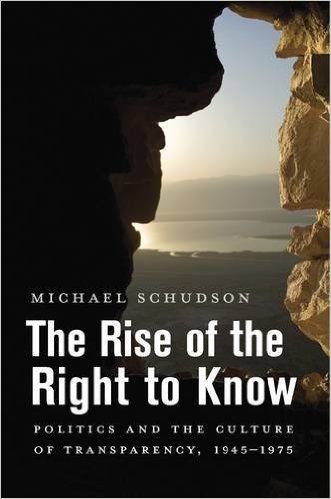By MARTHA MINOW
Review of The Rise of the Right to Know: Politics and the Culture of Transparency, 1945-1975, by Michael Schudson
Harvard University Press, 2015
The idea that the public has a "right to know" has a recent origin. Apparently the phrase first appeared in a journalist's speech in 1945. Not until the 1960s did any American laws effect the right, through the Freedom of Information Act, laws protecting consumer credit, and the requirement of Environmental Impact Statements for all federal action, enacted in 1970. Another round came later in the 1970s, by means of sunshine reforms for Congress and the creation of Inspectors General in many departments. Neither the founders of the nation nor their lawmaker heirs called for a citizens’ right to information during the 19th century or the first half of the 20th. Sociologist Michael Schudson whets the reader’s appetite with this arresting observation, and then offers satisfying case studies with explanations for changes since the 1950s. The book portrays political and social contexts that helped establish unprecedented demands for, and practices of, transparency in government processes and in the lives of public officials, as well as transparency about risks to health, safety, and the environment from economic developments.
What changed? Schudson identifies general trends including the rise of the administrative state, opinion polls and social movements, and the expansion of higher education. Particularly telling are key reforms emerging from conflicts among branches of the federal government. In the 1960s, Congress sought to reassert authority over objections from the growing Executive branch; after the Watergate scandals, Congress instituted reforms that a weakened Executive could not block; and ever since the Civil Rights movement, the judiciary has made room for litigation advancing political agendas, partly because the other branches were slow to respond or resistant to demands. Key figures creating the right to know are mostly themselves not well-known. Congressman John Moss pressed for what is now called FOIA, public policy professor Lynton Keith Caldwell proposed environmental impact statements, Senator Philip Hart led the fight for consumer protection information, and Congressman Richard Conlon pushed for openness in congressional process. Besides disclosing much about the rise of the "right to know," this book offers vivid examples of the interactions connecting large trends and particular individuals.
The book could have done more to explore the dynamics of scandal in American politics. And because its focus ends in 1975, it offers only tantalizing hints of changes in disclosure and secrecy coming with the Internet, the decline of investigative journalism, and other recent developments. Especially intriguing are closing comments about how secrecy persists and takes new forms. It is enough to make me hope that Schudson turns next to these themes and examines future prospects for the right to know.
Posted on 30 October 2015
MARTHA MINOW is the Morgan and Helen Chu Dean and Professor of Law at Harvard Law School. Her most recent book is The First Global Prosecutor: Promise and Constraints, (University of Michigan Press, 2015), co-edited with Cora True-Frost and Alex Whiting.

